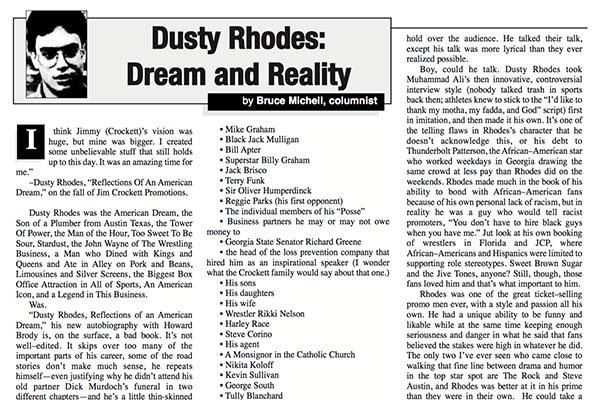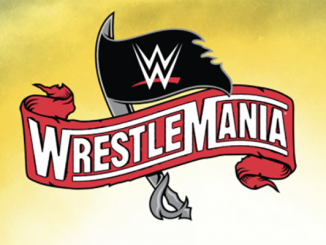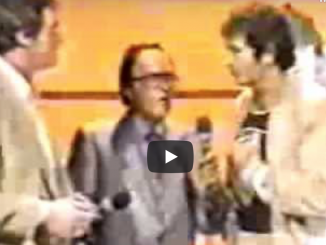
SPOTLIGHTED PODCAST ALERT (YOUR ARTICLE BEGINS A FEW INCHES DOWN)...
This month marks the 25th Anniversary of Bruce Mitchell becoming a Pro Wrestling Torch Newsletter columnist. No single person has influenced the editorial tone and direction of the Torch brand over the years than Bruce, who brought a hard-hitting, supremely well-informed, speak-truth-to-power approach to his writing. He went after sacred cows out of the gate, such as the beloved among “smart fans” (today’s “Internet fans” or “IWC,” I suppose) Eddie Gilbert and Jim Cornette. He also went hard after people in positions of authority and power who were abusing or misusing that power, or just not delivering a worthy product. He has also applauded and paid tribute to the greatest moments and movements in pro wrestling over the last 25 years, with a style of writing that has yet to be matched anywhere, I contend (despite Bill Simmons’s arrogant and uninformed contention last year that no one wrote at a high level about pro wrestling until his “Masked Man” columnist came along).
To celebrate and highlight Bruce’s stellar 25 years of influential and eloquent truth-telling about this fascinating industry, we’ll be featuring a single column from each of the last 25 years each of the first 25 days this month. His long-form columns were a pioneer approach to pro wrestling journalism, and the next 25 years you’ll experience a slice of what it is that has earned Bruce Mitchell widespread recognition within the industry over the years as being “Pro Wrestling’s Most Respected Columnist.” We began on Oct. 1st with his very first column, from Pro Wrestling Torch Newsletter #89 (cover dated Oct. 5, 1990).
Today we feature his column from the April 23, 2005 edition of the Pro Wrestling Torch Weekly Newsletter (#858) titled “Dusty Rhodes: Dream & Reality” that went in-depth on the just-released autobiography of Dusty Rhodes.
NOTE: VIP members can access hundreds of Mitchell columns instantly in the BRUCE MITCHELL LIBRARY here, part of the massive unmatched online archives of insider wrestling coverage from over the past 28 years.
===
“I think Jimmy (Crockett)’s vision was huge, but mine was bigger. I created some unbelievable stuff that still holds up to this day. It was an amazing time for me.”
–Dusty Rhodes, “Reflections Of An American Dream,” on the fall of Jim Crockett Promotions.
Dusty Rhodes was the American Dream, the Son of a Plumber from Austin Texas, the Tower Of Power, the Man of the Hour, Too Sweet To Be Sour, Stardust, the John Wayne of The Wrestling Business, a Man who Dined with Kings and Queens and Ate in Alley on Pork and Beans, Limousines and Silver Screens, the Biggest Box Office Attraction in All of Sports, An American Icon, and a Legend in This Business.
Was.
“Dusty Rhodes, Reflections of an American Dream,” his new autobiography with Howard Brody is, on the surface, a bad book. It’s not well–edited. It skips over too many of the important parts of his career, some of the road stories don’t make much sense, he repeats himself—even justifying why he didn’t attend his old partner Dick Murdoch’s funeral in two different chapters – and he’s a little thin-skinned about what a big-time star he was.
Reading this book is very much akin to watching a wrestling show booked by Rhodes that featured Rhodes as the number one babyface. Everyone—heel or face, in a storyline with Rhodes or not—is required to talk about how great Dusty Rhodes is. Back in the day, if Oregon’s top star Billy Jack was debuting in Florida, his first feud was with Dory Funk, Jr. because he told Funk he was the second best athlete in the history of West Texas State behind Dusty. If The Road Warriors, badasses who liked nobody to this point, needed a partner to go after the new six man titles booker Dusty created so he could team with the badass Road Warriors, they called on their Brother of the Road Dusty, even though it was a ridiculous visual. If Tully Blanchard thought it was a little much to talk up Dusty all the time, well, he could go work Jimmy Valiant B–shows until he knew better.
Dusty Rhodes is so thin–skinned in this book he includes testimony on every other page to how great a father/brother/husband he is, how big a star he is, how smart he is, what a good friend he is, and what an inspiration he was from dozens of people. The list of suppliants includes, but is not limited to:
• Steve Austin
• Willie Nelson
• Playboy Gary Hart
•All of his brothers
•His sister
• Jim Ross
• Mike Graham
• Black Jack Mulligan
• Bill Apter
• Superstar Billy Graham
• Jack Brisco
• Terry Funk
• Sir Oliver Humperdinck
• Reggie Parks (his first opponent)
• The individual members of his “Posse”
• Business partners he may or may not owe money to
• Georgia State Senator Richard Greene
• The head of the loss prevention company that hired him as an inspirational speaker (I wonder what the Crockett family would say about that one.)
• His sons
• His daughters
• His wife
• Wrestler Rikki Nelson
• Harley Race
• Steve Corino
• His agent
• A Monsignor in the Catholic
• Nikita Koloff
• Kevin Sullivan
• George South
• Tully Blanchard
• Magnum T.A.
• Jim Cornette (who tells the best story in the whole book).
Cornette, in fact, pulls off the exact opposite of the trick Mick Foley pulled at his introduction for Don Muraco’s induction to the WWE Hall of Fame and in his forward to Terry Funk’s book. He tells a story about the Midnight Express that’s really about the best qualities of Dusty Rhodes.
A chapter at the end of the book takes the cake. Dusty Rhodes, through his own website and a news website, ran a contest to find the Top Ten Fans of Dusty Rhodes. Since Dusty hadn’t been a major star on the national stage in 16 years, the news website was forced to solicit entries more than once. Strangely enough, most of the ten winners started watching Dusty in the days of his WWWF Title matches with champion Superstar Billy Graham in Madison Square Garden. Maybe Rhodes wanted to remind someone up north about what a big deal he was there.
Staying dedicated to the American Dream all these years hasn’t been easy, even if, as one contestant writes, Rhodes “is a simple, unassuming man who just wanted what was rightfully his.” Neither is reading this chapter, Rhode’s ultimate Valentine to himself.
The truth is, Rhodes’s resume doesn’t need all this affirmation, because a major part of his life story is that he really was one of the very top performers and behind the scenes powers in the business during his ’70s and ’80s heyday. Dusty Rhodes had the rarest and most valuable commodity of them all in pro wrestling, an absolute emotional hold over the audience. He talked their talk, except his talk was more lyrical than they ever realized possible.
Boy, could he talk. Dusty Rhodes took Muhammad Ali’s then innovative, controversial interview style (nobody talked trash in sports back then; athletes knew to stick to the “I’d like to thank my motha, my fadda, and God” script) first in imitation, and then made it his own. It’s one of the telling flaws in Rhodes’s character that he doesn’t acknowledge this, or his debt to Thunderbolt Patterson, the African-American star who worked weekdays iN Georgia drawing the same crowd at less pay than Rhodes did on the weekends. Rhodes made much in the book of his ability to bond with African-American fans because of his own personal lack of racism, but in reality he was a guy who would tell racist promoters, “You don’t have to hire black guys when you have me.” Just look at his own booking of talent in Florida and JCP, where African–Americans and Hispanics were limited to supporting role stereotypes. Sweet Brown Sugar and the Jive Tones, anyone? Still, though, those fans loved him and that’s what important to Rhodes.
Rhodes was one of the great ticket–selling promo men ever, with a style and passion all his own. He had a unique ability to be funny and likable while at the same time keeping enough seriousness and danger in what he said that fans believed the stakes were high in whatever he did. The only two I’ve ever seen come close to walking that fine line between drama and humor in the top star spot at The Rock and Steve Austin, and Rhodes was better at it in his prime than they were in their own. He could take a stupid gimmick, like Ole Anderson’s Blind Man’s Match in Georgia, and by finding that one believable nail to hang his promo on (in this case yelling “I can smell ya! Pig! Pig!”) he found something to run several months of shows on. Rhodes was a master of the aggrieved revenge interview, probably from all the practice he got from when his jealous partners all turned on him. His first interview in the ’70s on the old WWWF syndicated show, where an obviously delighted Vince McMahon Jr, captivated by the young Rhodes’s charisma, listened as the Dream wove a shaggy dawg story about biting all the Northeast heels on the ankle. You could see in Vince Jr.’s eyes the beginnings of his own ideas for a more entertaining wrestling product. That sense of charisma and fun was Rhodes at his best.
Rhodes tells a story in the book of a dying Vince Sr., knowing his son was about to go national and destroy the territory system he himself had thrived on, calling him. Vince Sr. tells Rhodes, “Don’t let this happen. You have the power to not this happen.”
So you know Vince Jr. owes him.
As it turned out, Rhodes worked harder than anyone to stop the expansion of Titan Sports, but in the end, because of his own inadequacies, he couldn’t stop Vince K. McMahon either.
Rhodes was never better than when he gave one of his honkin’, Bob Dylan qoutin’, breath catchin’, feelings hurtin’ soliloquies about why he is so great and so much better than anyone else. He used language like a rural rapping poet, binding himself to a certain economic demographic—white, black, and Hispanic—who knew what it was like to strive all week, and then hit the bar on Friday and Saturday night. Rhodes was so over he could lie in the ring and bleed (he wasn’t a good worker, and he got fatter and lazier as the years went by), then make a short comeback and his fans still adored him. Crappy finishes, or the lack of any finish at all, were no factor at all. This all came back to haunt him when the business became more disciplined.
John Bradshaw Layfield calls himself “a Wrestling God” these days, but that’s just part of his gimmick as a rich guy heel being set up for the fall. Dusty Rhodes, in Florida, the WWWF, and before 1987 in Jim Crockett Promotions, really was a Wrestling God. The more he made himself the center of attention, the more he was rewarded, both financially and with fan worship. He partied with the legendary Studio 54 club trash, like Andy Warhol, Halston, Cheryl Tiegs, and Peter Beard, He hung with Country Music’s Outlaws like Willie Nelson and David Allen “Take This Job and Shove It” Coe. He inspired a whole generation of wrestlers by wiggling his fat ass, including Hulk “Yellowfinger” Hogan. As he admits in the book, he pissed away all of his riches, even if he doesn’t doesn’t write much about how he accomplished it, but he was paid as much at the time as anyone in the game.
What is disappointing about this book, and so revealing about Rhdoes and his failure in the last 20 years, is his absolute refusal and inability to reflect on that failure and his diminishing star power. There’s so much he just skips over that was important to his career, because Dusty Rhodes has never learned from his mistakes, and he resents anyone not in his wrestling family who challenged him for power or notoriety. He never addresses:
•The role of “Cowboy” Bill Watts in his career, the booker who first crafted his American Dream persona. Rhodes doesn’t even correctly run down the angle where he finally turned against Gary Hart and the late Pak Song, claiming he did it against NWA World Champion Jack Brisco, because it makes it seem more important. Too bad, because the truth is, it was one of the most successful angles of the ’70s.
•Ole Anderson, the part owner and booker of Georgia Championship Wrestling, who featured him so strongly on the Superstation that was such an important factor in making him a national star. •His rift with his mentor Eddie Graham and his subsequent departure from Florida Championship Wrestling
•The most famous feud in his career, the battles with “Nature Boy” Ric Flair. It’s sad that his resentment of Flair, whom he kills with backhanded compliments, keeps him from writing about one of his greatest successes, the lucrative feud that started with Dusty saving Flair from Ivan & Nikita Koloff in the steel cage in Atlanta’s Omni, the power of which expanded Jim Crockett Promotion’s nationwide. There’s nothing in this book about their Starrcade main events at all. Rhodes’s pettiness here hurts his own case in asserting himself as one of the icons in the business.
•His blatant refusal to stop booking JCP around his old, tired, fat act even as legions off JCP fans were booing him and not supporting the promotion any more. What was it like for Rhodes, who was worshipped for so long, to face bitter rejection from so many fans who were sick of him being put over newer and better acts? What was it like to see the heel Four Horseman become such a cult popular phenomenon, in part in response to his own overbearing act, that both Raw and Smackdown are heavily influenced by them today?
(I saw this with my own eyes, Rhodes’s arrogant anger at fans like me, his crotch–grabbing and swearing, his sullen resentment of anyone who didn’t buy into his act. I’ve never seen a wrestler, entertainer. or athlete who seemed to resent all the fans who came to his events more than Dusty Rhodes in the later part of the ’80s.)
•The turmoil around the sudden departure of top WCW tag team Arn Anderson & Tully Blanchard for the rival WWF.
•The battle for political power after the Crockett family was forced to sell World Championship Wrestling to Turner Broadcasting. Rhodes, under pressure to give up the top babyface slot in favor of Sting and Ric Flair, took an incredible gamble. He defied an edict from TBS to tone down the violence and booked a very bloody angle where the Road Warriors (Hawk, specifically) stabbed him in the eye. Rhodes gambled that this issue would draw so much money and interest he would be back as the top political power in the company. It didn’t work out that way and Rhodes was out. What was Rhodes’s side of what happened? He never even mentions it.
Rhodes does examine the fall of Jim Crockett Sports, but unsurprisingly, and gallingly, takes no responsibility at all, even though he was booking himself on top while revenue streams were dropping at an alarming rate. He has the nerve to lay it all at the feet of the company accountant, who didn’t stop Dusty Rhodes and Jimmy Crockett from their uncontrolled spending even as the money was drying up. It’s telling that Rhodes sees himself even to this day as a huge star and a booking genius, despite twenty years of evidence to the contrary.
And the Dusty finish? He resentfully acts like he shouldn’t even say the words, that his constantly pulling the rug out from under loyal fans show after show, month after month, getting their hopes for a title change then ripping it away never happened.
If you know the truth about Dusty Rhodes and his inability to change and learn from his mistakes, this book has some value, but only by omission. It’s the parts that Rhodes can’t admit to himself that make this an interesting read. You can see why his booking stint in TNA has so far been a bust, because this business evolves constantly, and Rhodes’s stubborn refusal to let go of the time when he was a Dream actually has kept him from getting his due as an influential star in the pro wrestling business.
END COLUMN
CHECK OUT PREVIOUS YEARS’ SELECTIONS OF BRUCE MITCHELL COLUMNS OVER THE LAST 25 YEARS: CLICK HERE




Leave a Reply
You must be logged in to post a comment.